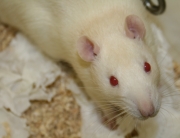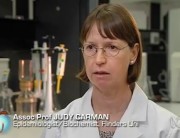ASHLEY HALL: A study has thrown doubt on the safety of genetically modified corn and soy. It found pigs that eat the genetically modified feed suffer a significantly higher incidence of health problems.
The study”s lead author says her results show the need for better regulation of GM foods. But the GM industry has responded by attacking the credibility of the author and the journal which has published the study.
Simon Lauder reports.
SIMON LAUDER: Genetically modified crops are grown widely in many countries, including the USA, that”s where this study was based. Researchers raised two sets of 84 pigs on different diets at a commercial piggery. One group ate GM corn and soy, the other ate a non-GM diet.
The farmers didn”t know which was which nor did the veterinarians who conducted autopsies when the pigs were slaughtered after about five months.
Dr Judy Carman is the study”s lead author.
JUDY CARMAN: And that”s when we found two major findings. The first was that the weight of the uterus in the female pigs was 25 per cent heavier in those that were fed the GM feed compared to those that were fed the non-GM feed. And the other main finding is that we looked inside the stomachs and the results show quite clearly that the level of severe stomach inflammation in the GM-fed pigs was much higher than in the non-GM fed pigs.
So overall it was 2.6 times higher in the GM-fed pigs.
SIMON LAUDER: Would those gastric or uterine differences have been a real health concern for those pigs?
JUDY CARMAN: If the pig wanted to get pregnant it might have been. I imagine that it would have been unpleasant to be the pig with a stomach like that. It didn”t actually influence the body weight of the pig or the life, how many pigs die during the experiment or anything like that. But it would certainly not have been pleasant to have that stomach.
SIMON LAUDER: What do you suppose this means for the human diet?
JUDY CARMAN: The thing about a pig is that their digestive system is very similar to that of a human and my interest has always been in human health outcomes from eating GM food, so the fact we”ve got these results in the stomachs of pigs means that we should really start looking to see if we”re getting similar effects in the stomachs of humans.
SIMON LAUDER: A study published last year indicated there were higher death rates, and more tumours in GM-fed rats. That study sparked a furious debate and prompted accusations that it was not a credible study. The industry has launched a similar attack on this study.
Matthew Cossey is the head of CropLife Australia which represents the agricultural biotechnology sector.
MATTHEW COSSEY: We seem to have a bit of pseudoscience by media release here rather than credible review by scientific peers.
SIMON LAUDER: The Journal of Organic Systems has been around since 2006 and is peer reviewed.
MATTHEW COSSEY: I think what we have is a report that is written by two well acknowledged anti-GM activists and I think that on our initial look at the study there”s some serious questions over its methodology.
SIMON LAUDER: Dr Judy Carman rejects the industry”s assertion that her conclusions go against the vast weight of scientific evidence.
JUDY CARMAN: This sort of study we did is exceptionally rare so you can”t compare our study with all of the other industry studies that they”ve done.
SIMON LAUDER: Are you as CropLife says a veteran anti-biotech campaigner?
JUDY CARMAN: No. The GM industry labels anyone anti-GM if they have any questions about the safety of GM crops and that is unfortunate they try and shoot the messenger so that people don”t listen to the message.
I”ve got degree after degree in medical research and in scientific research, I”m an adjunct associate professor at Flinders University, between us we”ve got expertise in a whole pile of different areas, and no we are not anti-GM activists.
SIMON LAUDER: CropLife also says that the study was published in an obscure online journal which was founded by anti-biotech groups.
JUDY CARMAN: Well that”s their view (laughs). This paper went out to peer review, it”s a peer reviewed paper in a peer reviewed journal. It was reviewed by three experts, they were anonymous and I don”t know who these reviewers were but I can assure you it was not reviewed in house by the journal, it went out to independent people out who had expertise in this area and they – all three of them said it should be published.
SIMON LAUDER: GM corn and soy are not grown in Australia, but can be imported in foods or as ingredients in locally manufactured food. The food regulator, Food Standards Australia New Zealand, says Australia has one of the most comprehensive frameworks for labelling GM foods in the world.
But Dr Carmen says the compulsory labelling of GM foods doesn”t extend to ingredients which have been refined.
JUDY CARMAN: The particular combinations that we fed in this pig diet, they have approved all of those to come into the human food supply in Australia.
SIMON LAUDER: Food Standards says it will publish a response to Dr Carman”s study, after examining it carefully.
ASHLEY HALL: Simon Lauder.




































